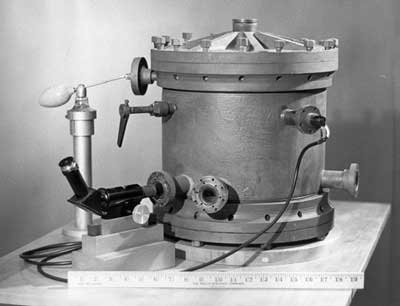 Robert Millikan's 1909 oil drop experiment is an American classic. It won Millikan the 1923 Nobel Prize in Physics. It spawned Paul Allen Stokstad's COmpany, PASCO. It made a surprising appearance in David Goodstein's Mechanical Universe, despite electron charge being decidedly non-mechanical. It's a great episode in that it elucidates the nature of the process of science (while debunking the overly simplified but easily posterized "scientific method").
Robert Millikan's 1909 oil drop experiment is an American classic. It won Millikan the 1923 Nobel Prize in Physics. It spawned Paul Allen Stokstad's COmpany, PASCO. It made a surprising appearance in David Goodstein's Mechanical Universe, despite electron charge being decidedly non-mechanical. It's a great episode in that it elucidates the nature of the process of science (while debunking the overly simplified but easily posterized "scientific method").We do not conduct the experiment in my high school physics classes. But we do watch the episode of The Mechanical Universe. And we do a very dry-labbed worksheet, originated by my mentor at Ann Arbor Huron High, Walt Scheider: The Millikan Oil Drop Experiment.
But before we do any of that, we solve a related quantization puzzle. Lab groups are given a set of numbers that could have been obtained by measuring the mass of various numbers of identical balls in a container. From the numbers, students must determine the mass of a single ball and the mass of the container.
Once the students have done that, we measure the mass of actual containers of various numbers of drilled balls. I'm a huge fan of drilled balls—every physics classroom should be rich with drilled balls. We measure the masses down to the grams and students get good results.
[Hint: don't use fewer than three balls in the lightest set and vary the number of balls by 2 and or 3 (but not by 1) between sets.]
Here's the worksheet for that. Millikan Mystery.
Love the mass of balls analogy with Millikan. We do the experiment every year and the students are frustrated that after they finally get some data it's still hard to analyze.
ReplyDeleteMy question: What more would you students learn if they took the time to actually collect the data in addition to analyzing some other data? Maybe not much? I'm not sure.
#NaBloCoMo
In the high school setting, the Millikan seems cumbersome and too much buck for too little bang. I like the exercise of sorting seemingly random data to reveal the hidden quantization. To me, that's of greater value than chasing down 1.6E-19 C. But I never presume that I possess The One True Path. And maybe walking in Millikan's footsteps has value I don't yet see.
ReplyDelete